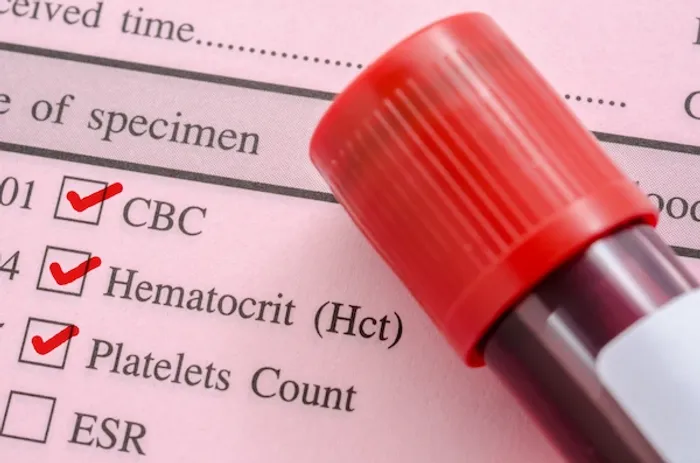Low Platelets in CBC: Is It Dengue or Something Else?
A low platelet count (thrombocytopenia) in your CBC can signal dengue, but many other conditions, from infections to autoimmune issues, can also be the cause. Learn common symptoms and when to seek medical help.

Written by
Last updated on 18th Jul, 2025

The monsoon season, while a welcome respite from the scorching heat, often brings with it a surge in mosquito-borne illnesses. Among these, dengue fever frequently takes centre stage, often associated with a concerning drop in platelet count. A Complete Blood Count (CBC) test is your first line of defence in understanding these changes, particularly when you notice a low platelet CBC test result.
What Platelet Drop Patterns Look Like in Reports
Understanding the patterns of platelet drops in your CBC reports is key to discerning the underlying cause. A single low reading isn't always a cause for immediate alarm, but the trend and the presence of other symptoms provide a more complete picture.
In the context of infections like dengue, the platelet count typically starts to fall around the 3rd to 7th day of fever, often reaching its lowest point around the 5th to 9th day. This drop is usually followed by a gradual rise as the patient recovers. The severity of the drop can vary widely. A mild drop (e.g., above 100,000) might be managed with home care and monitoring, while a significant fall (e.g., below 50,000) requires closer medical attention.
Beyond dengue, other conditions can also lead to a decrease in platelets. These include viral infections like chikungunya, malaria, measles, mumps, and HIV, as well as bacterial infections. Certain medications, autoimmune diseases, bone marrow disorders, and even excessive alcohol consumption can also impact platelet production or increase their destruction. Therefore, while a dengue platelets drop is a known characteristic, it's crucial to consider the broader clinical context and not jump to conclusions.
CBC + NS1, Dengue and Malaria Markers
When fever strikes, especially during the monsoon, a doctor will often recommend a combination of diagnostic tests to pinpoint the cause. The Complete Blood Count (CBC) is almost always the starting point. It provides a comprehensive overview of your blood cells, including platelets, red blood cells, and various types of white blood cells. A CBC test can help identify signs of infection, inflammation, or anaemia. Apollo 24/7 offers a Complete Blood Count (CBC) Test, which can provide these vital insights into your blood health.
Beyond the general CBC, specific markers are crucial for diagnosing mosquito-borne diseases.
- Dengue NS1 Antigen: This is a non-structural protein released by the dengue virus into the bloodstream during the early stages of infection (typically within the first 1-5 days of fever). A positive NS1 antigen test indicates an active dengue infection. This test is particularly useful for early diagnosis, even before antibodies are produced.
- Dengue IgG and IgM Antibodies:
IgM antibodies usually appear in the blood 4-5 days after the onset of fever and remain detectable for several weeks. Their presence suggests a recent or acute dengue infection.
IgG antibodies develop later, typically within 7-10 days of symptoms, and can persist for months or even years. Their presence indicates a past infection or long-term immunity. A combination of these antibody tests helps to confirm a dengue diagnosis and determine the stage of infection. - Malaria Parasite (MP) Test: Given the overlapping symptoms with dengue, especially in endemic areas, a malaria test is often recommended. This test looks for the presence of malaria parasites in the blood. If left undiagnosed, malaria can also lead to a drop in platelet count.
- Rapid Tests: For quick preliminary results, rapid tests for dengue (like the Dengue IgM Rapid Test) and malaria are also available. While convenient, positive rapid test results often require confirmation with more definitive tests like ELISA or PCR.
A comprehensive approach often involves a combination of these tests, especially within a fever panel, to rule out or confirm various infections. This multi-pronged diagnostic strategy helps doctors differentiate between dengue and other febrile illnesses, leading to more accurate treatment plans.
Book Complete Blood Count (CBC)
When to Retest Every 24 Hours
The decision to retest your blood every 24 hours, particularly for platelet count, is crucial in managing conditions like dengue. This practice is usually recommended when:
- Suspected or Confirmed Dengue: Once dengue is suspected or confirmed, daily monitoring of platelet count, and sometimes haematocrit (packed cell volume), becomes essential. This helps in tracking the disease progression and identifying warning signs of severe dengue.
- Significant Platelet Drop: If your initial CBC shows a noticeable drop in platelet count, your doctor will likely advise daily retesting to observe the trend. A continuous or rapid fall is a red flag.
- Clinical Deterioration: Even if platelet counts are not critically low, any worsening of symptoms such as persistent vomiting, severe abdominal pain, bleeding (from nose, gums, or skin), lethargy, or restlessness warrants immediate retesting and medical evaluation. These are signs that the patient might be entering the critical phase of dengue, even if the platelet count is still relatively stable.
- Monitoring Recovery: As a patient recovers from dengue, daily monitoring continues until the platelet count shows a consistent upward trend and stabilises within the normal range. This ensures that the recovery is progressing as expected and helps in preventing premature discharge or missed complications.
Retesting every 24 hours provides invaluable data for your healthcare provider to make informed decisions about your care. It allows for timely intervention, such as fluid management or platelet transfusions, if the situation deteriorates.
Book Apollo Fever Panel Complete
Platelet Range Guide for At-Home Monitoring
While medical supervision is paramount, understanding basic platelet ranges can help you with at-home monitoring and empower you to communicate effectively with your doctor. Remember, these are general guidelines, and your doctor's advice should always take precedence.
- Normal Range: 150,000 to 450,000 platelets per microlitre. If your count is within this range and you have no symptoms, there's generally no concern.
- Mild Thrombocytopenia (100,000 - 150,000): Often seen in various viral infections. Close monitoring is recommended, but usually no specific treatment for the low platelet count itself is needed if there are no bleeding symptoms.
- Moderate Thrombocytopenia (50,000 - 100,000): This range typically triggers more frequent monitoring, often daily. Your doctor will assess any signs of bleeding. Activity might be restricted to prevent injury.
- Severe Thrombocytopenia (20,000 - 50,000): This level requires hospitalisation for close observation. There's an increased risk of spontaneous bleeding, and medical intervention may be necessary.
- Critical Thrombocytopenia (Below 20,000): This is a medical emergency. The risk of serious bleeding, including internal bleeding, is high. Platelet transfusions might be considered based on the clinical picture and presence of bleeding.
When to panic vs. monitor:
Monitor: If your platelet count is mildly or moderately low, and you have no signs of bleeding, your doctor will likely advise close monitoring, fluid intake, and rest. The trend (whether it's falling rapidly or slowly recovering) is more important than a single value.
Panic (Seek Immediate Medical Attention): You should be concerned and seek immediate medical attention if:
- Your platelet count drops below 50,000, even without bleeding.
- You experience any signs of bleeding (skin rashes, nosebleeds, gum bleeding, blood in urine or stool, unusual bruising).
- You develop severe abdominal pain, persistent vomiting, lethargy, or confusion.
- The platelet count continues to drop rapidly despite interventions.
Get These Tests If You've Dengue
Book Dengue Risk CBC Panels on Apollo 24/7
In the fight against dengue and other febrile illnesses, timely and accurate diagnosis is paramount. Apollo 24/7 offers a range of diagnostic tests and packages designed to help you and your healthcare provider quickly assess your condition. These services bring the convenience of sample collection to your doorstep, ensuring you can focus on recovery.
For a comprehensive evaluation, especially during the monsoon season, consider the following popular tests and packages available on Apollo 24/7:
- Apollo Fever Panel Complete: This comprehensive package includes essential tests like Malarial Test, Urine Routine Test, CBC Test (Complete Blood Count), Dengue IgG & IgM - Elisa, Widal Test, ESR Test, CRP Test, Dengue NS1 Antigen - Elisa, and Typhidot Test. It's a holistic approach to diagnosing the underlying cause of fever, making it an excellent choice for a thorough check.
- CBC Test (Complete Blood Count): As discussed, this foundational test provides a general overview of your blood health, including your platelet count. It's often the first step in diagnosing various conditions.
- Dengue NS1 Antigen - Elisa Test: For early detection of dengue, the NS1 antigen test is highly recommended during the initial days of fever.
- Dengue IgG & IgM - Elisa Test: These antibody tests are crucial for confirming dengue infection and understanding its stage, whether it's an acute or past infection.
- Dengue IgM Rapid Test: For quick preliminary results, especially when time is of the essence, the rapid IgM test can provide an early indication of dengue.
By utilising these easily accessible and reliable diagnostic services, you can empower yourself with the information needed to make timely health decisions.
Conclusion
Understanding the nuances of a low platelet count, especially during the monsoon season, is vital for your health and peace of mind. While a low platelet CBC test can be alarming, it's the pattern, accompanying symptoms, and expert medical interpretation that truly reveal whether it's a transient issue or a serious concern like a dengue platelet drop. By familiarising yourself with key diagnostic tests such as CBC, NS1 antigen, and dengue antibody tests, and knowing when to seek urgent medical attention versus when to simply monitor at home, you can become an active participant in your healthcare journey.

